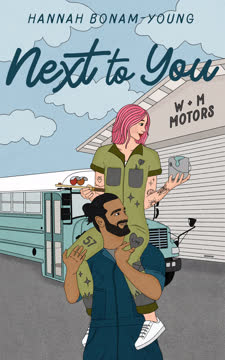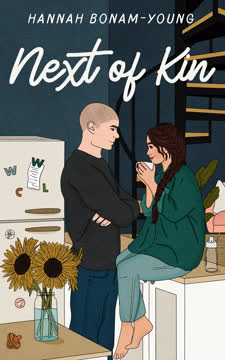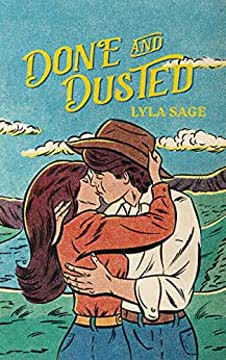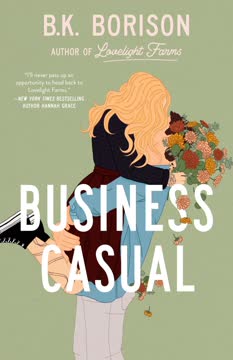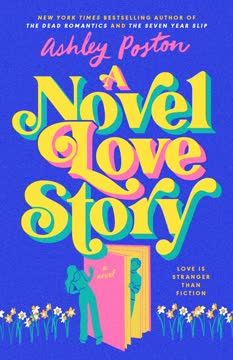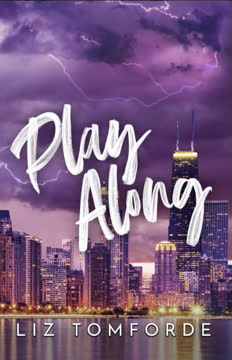Plot Summary
New Year's Unlikely Kiss
Lane, anxious and adrift after her father's death, attends a New Year's Eve party dreading connection. There, she meets Matt, a gentle, grounded mechanic with a big family and a calming presence. Their banter is easy, their chemistry undeniable, and as midnight strikes, Lane impulsively kisses Matt. The moment is sweet, electric, and vulnerable—so much so that Lane flees, overwhelmed by the possibility of something real. This fleeting connection plants a seed of hope in Lane's otherwise numb existence, hinting at the possibility of happiness after loss, even as she retreats into her comfort zone.
Dry Spells and Resolutions
Fifteen months later, Lane's life is stagnant: her friends are coupled up, her job is uninspiring, and her romantic life is a desert. On her 27th birthday, she signs up for a dating app, only to be met with disappointment and awkwardness. Her friendship with Matt has grown, but he's firmly in the "friend zone," despite their obvious connection. Lane's anxiety and grief still shape her days, but she's trying—making resolutions to be a better daughter, sister, and friend. The ache of missing her father and feeling left behind by life is ever-present, but so is the stubborn spark of hope.
Friendship, Flirtation, and Fear
Lane's circle of friends celebrates her birthday, and Matt is there—steady, supportive, and increasingly hard to ignore. Their friendship is full of inside jokes, movie nights, and unspoken longing. Lane is determined not to cross the line, fearing the loss of friendship and the risk of heartbreak. Yet, their chemistry simmers beneath every interaction, and the people around them—especially their meddling friends—see what they refuse to admit. Lane's anxiety and self-doubt keep her from acting, but the tension between them grows, making it clear that friendship alone may not be enough.
The Bus That Changed Everything
In a late-night, slightly drunken haze, Lane buys a school bus online, envisioning a new life as a nomad. The bus becomes a symbol of freedom, healing, and the possibility of building something for herself. Matt offers to help her retrieve and renovate it, and their road trip together is filled with confessions, laughter, and moments of raw vulnerability. The bus project draws them closer, forcing Lane to confront her fears, her grief, and her desire for more than just friendship. The journey is messy, but it marks the beginning of Lane's transformation.
Road Trip Confessions
The long drive to pick up the bus becomes a crucible for Lane and Matt. They share stories of family, loss, and longing, and Lane finally opens up about her father's death and the guilt she carries. Matt listens without judgment, offering comfort and understanding. Their emotional intimacy deepens, and the boundaries between them blur further. A night in a terrible motel—complete with a broken bed and a rat—leads to laughter, accidental cuddling, and the realization that their connection is more than platonic. The road trip cements their bond, even as Lane's fear of loss lingers.
Building, Breaking, Becoming
Back home, Lane throws herself into renovating the bus with Matt's help. The physical labor is cathartic, and the project becomes a metaphor for rebuilding her life. Their friendship is tested by proximity, attraction, and the opinions of their friends, who are rooting for them to get together. Lane's anxiety flares, and she struggles with feelings of inadequacy and the fear of ruining what they have. Yet, as they work side by side—tearing out seats, painting, and sharing late-night talks—their partnership deepens, and Lane begins to imagine a future where she is not defined by her grief.
Friends with Complications
The tension between Lane and Matt finally boils over after a disastrous date with someone else. Alone together in the bus, they give in to their desire, crossing the line from friends to lovers. The sex is passionate, affirming, and healing for Lane, who has long felt unworthy of intimacy. Yet, the morning after brings anxiety and uncertainty. Lane fears that she is using Matt as a crutch, and Matt, ever patient, assures her that he wants whatever she can give. They agree to keep things casual, but both know that their feelings run deeper than they admit.
The Line Between Want and Need
As Lane and Matt navigate their new arrangement, old fears resurface. Lane is haunted by the belief that loving deeply only leads to pain, as it did with her father's death. She pushes Matt away, convinced that she is protecting them both from inevitable heartbreak. Matt, for his part, is willing to wait, but the distance hurts. Their friends see the truth: Lane and Matt are already each other's person, but Lane must choose to fight for happiness rather than run from it. The bus, nearly finished, stands as a testament to what they could build together—if Lane is brave enough.
Family, Grief, and Ghosts
Lane's sister's wedding brings family tensions and unresolved grief to the surface. Lane is forced to confront her guilt over her father's death, her strained relationship with her mother and sister, and her pattern of running away from pain. Matt stands by her side, meeting her family and offering unwavering support. The wedding becomes a turning point: Lane's sister calls off the marriage, and Lane realizes that she, too, must stop living in fear. Therapy, honest conversations, and the support of loved ones help Lane begin to forgive herself and imagine a future not defined by loss.
The Bus as Sanctuary
With the bus complete, Lane moves in, finding solace and pride in the space she created. Therapy helps her process her trauma, and she begins to reconnect with her family. Letters from Matt—sent faithfully during their time apart—remind her of the love waiting for her. The bus, once a symbol of escape, becomes a sanctuary where Lane can finally rest, heal, and dream. She realizes that she is ready—not just to love Matt, but to love herself and the life she is building.
Crossing the Friendship Rubicon
Lane, emboldened by her growth, travels to Matt's family home to find him. Their reunion is emotional, messy, and full of tears and laughter. Surrounded by Matt's loving, chaotic family, Lane proposes, offering her father's ring as a symbol of her commitment. Matt, overwhelmed with joy, accepts, and they are embraced by his family as one of their own. The proposal is not just a promise of marriage, but a declaration that Lane is done running from love, grief, and happiness. Together, they choose each other—imperfect, healing, and whole.
Sex, Secrets, and Self-Sabotage
Lane and Matt's physical relationship is passionate and playful, but it is their emotional honesty that cements their bond. They share their fears, desires, and insecurities, learning to be selfish with each other in the best way. Their love is not a cure for pain, but a safe place to land. They navigate the challenges of blending families, building a life together, and supporting each other's dreams. The bus becomes their home, a symbol of the life they are creating—one built on trust, vulnerability, and mutual care.
The Cost of Running Away
Lane's journey is one of learning to forgive herself and accept happiness. Therapy, family, and Matt's unwavering love help her see that she is not responsible for her father's death, nor is she doomed to repeat the past. She learns that running away from pain only prolongs it, and that true healing comes from facing it head-on. The cost of running away is missing out on the love and joy that are possible when she chooses to stay, to fight, and to hope.
Letters, Therapy, and Forgiveness
During their time apart, Matt writes Lane dozens of letters, pouring out his love, fears, and hopes. These letters become a lifeline, reminding Lane that she is loved and wanted, even when she feels unworthy. Therapy helps Lane process her grief and guilt, and she begins to see herself as deserving of happiness. Forgiveness—of herself, her family, and the past—becomes the key to moving forward. The letters, therapy, and Lane's own courage bring her back to Matt, ready to build a life together.
Coming Home to Each Other
Lane and Matt reunite, choosing each other fully and without reservation. They drive the bus home together, making love in every city along the way, savoring the mundane and the magical. Their friends and family welcome them back, celebrating their engagement and the life they are building. The bus, once a symbol of escape, is now a home—a place where Lane and Matt can be themselves, together. They are not healed, not perfect, but they are whole, and they are home.
Proposals, Promises, and Peace
Lane and Matt marry in an intimate ceremony surrounded by family and friends. Their vows are honest, messy, and full of hope. They promise to love each other through the good and the bad, to be each other's safe place, and to keep fighting for happiness. The wedding is not an ending, but a beginning—a promise to keep choosing each other, every day. Lane, once defined by grief and fear, is now defined by love, courage, and the peace she has found in Matt's arms.
Characters
Lane Rothsford
Lane is a graphic designer haunted by the sudden loss of her father in a car accident for which she blames herself. Her anxiety manifests as agoraphobia and self-sabotage, making her retreat from life and love. Lane is witty, deeply empathetic, and fiercely loyal to her friends, but struggles with feelings of inadequacy and the fear of losing those she loves. Her journey is one of learning to forgive herself, embrace vulnerability, and choose happiness. Through therapy, friendship, and her relationship with Matt, Lane transforms from a woman defined by grief to one who is brave enough to build a life—and a home—on her own terms.
Mattheus "Matt" Tilo-Jones
Matt is a mechanic with a big, loving family and a gentle, calming presence. He is the middle child of nine, raised on Vancouver Island in a home full of chaos, love, and resilience. Matt is a caretaker by nature, always putting others first and offering unwavering support. His own losses have made him empathetic, but he sometimes struggles to advocate for his own needs. Matt's love for Lane is deep, patient, and unconditional—he waits for her to be ready, writes her letters during their separation, and never gives up hope. His journey is about learning to be selfish in love, to ask for what he wants, and to trust that he is worthy of happiness.
Elizabeth "Liz" Rothsford
Lane's twin sister, Liz is the "left brain" to Lane's "right"—logical, ambitious, and often emotionally reserved. She pursues a career in medicine and a relationship that seems perfect on paper, but ultimately lacks true happiness. Liz's own struggles with grief and perfectionism mirror Lane's, and their relationship is strained by misunderstandings and unspoken pain. Liz's decision to call off her wedding becomes a catalyst for both sisters to confront their fears and support each other's healing. Her arc is about learning to choose herself, embrace vulnerability, and reconnect with her family.
Chloe Dove
Chloe is Lane's best friend and the glue of their friend group. She is married to Warren and mother to Willow, balancing the chaos of family life with her own creative pursuits. Chloe is a cheerleader for Lane, always encouraging her to take risks and believe in herself. She is perceptive, supportive, and unafraid to call Lane out when she's self-sabotaging. Chloe's own journey—navigating motherhood, marriage, and friendship—serves as a model of resilience and hope.
Warren Dove
Warren is Chloe's husband and Matt's business partner. He is a calming presence, offering practical advice and emotional support to both Lane and Matt. Warren's own experience with loss gives him insight into Lane's fears, and he encourages her to face her grief rather than run from it. He is a mediator, a confidant, and a steadfast friend, always rooting for Lane and Matt to find happiness together.
Emily Owusu
Emily is Lane's other best friend, engaged to Amos. She is a champion for her friends, always ready to celebrate their wins and support them through their struggles. Emily's own journey—embracing her identity and building a life with Amos—mirrors Lane's in its courage and vulnerability. She is a source of joy, wisdom, and unconditional love in Lane's life.
Amos Lopez
Amos is Emily's fiancé, known for his humor and devotion. He is a steady presence in the friend group, offering practical help and emotional support. Amos's relationship with Emily is a model of partnership and mutual respect, and his easygoing nature helps diffuse tension and bring people together.
Fetu Tilo-Jones
Matt's mother, Fetu, is the heart of the Tilo-Jones family. She has endured profound loss but remains joyful, hopeful, and deeply connected to her children. Fetu's Samoan heritage and spiritual beliefs shape her approach to grief and healing, offering Lane a new perspective on loss. She welcomes Lane into the family with open arms, modeling unconditional love and acceptance.
Simon Tilo-Jones
Matt's father, Simon, is a steady, supportive presence. He is devoted to Fetu and their children, offering wisdom, humor, and practical help. Simon's love for Fetu and his family is evident in everything he does, and he welcomes Lane as one of his own. His advice to Lane about loving and caring for natural givers like Matt is pivotal in her journey.
Willow Dove
Chloe and Warren's young daughter, Willow, represents the next generation and the possibility of happiness after hardship. Her presence brings lightness and laughter, reminding Lane and the others of the simple joys of life and the importance of family.
Plot Devices
The Bus as Metaphor
The school bus Lane impulsively buys becomes a central symbol and plot device. It represents her desire for freedom, control, and a fresh start, but also her need to build something lasting and meaningful. The process of renovating the bus—with Matt's help—mirrors Lane's internal journey: tearing down old structures, facing hidden problems, and slowly creating a space where she can feel safe and at home. The bus is also a literal vehicle for Lane's journey back to herself, her family, and ultimately, to Matt.
Letters as Bridge
During their separation, Matt writes Lane dozens of letters, pouring out his love, fears, and hopes. These letters serve as a bridge across distance and time, allowing Lane to feel loved and wanted even when she doubts herself. The letters are a narrative device that reveals Matt's inner world, deepens the emotional stakes, and ultimately helps Lane find the courage to return to him.
Grief and Forgiveness
The novel uses Lane's grief over her father's death—and her guilt about her role in it—as a central obstacle. Therapy, honest conversations, and the support of loved ones are woven throughout the narrative, showing that healing is messy, nonlinear, and ongoing. Forgiveness—of oneself, of others, and of the past—is depicted as both a plot device and a theme, driving Lane's transformation and her ability to choose happiness.
Friends as Greek Chorus
Lane's friends serve as a kind of Greek chorus, offering commentary, encouragement, and sometimes meddling in her relationship with Matt. Their perspectives, advice, and own life choices provide contrast and support, helping Lane see herself more clearly and pushing her toward growth.
Narrative Structure and Foreshadowing
The story is structured around pivotal moments—New Year's Eve, birthdays, weddings, and road trips—that echo and build upon each other. Early scenes foreshadow later developments: the first kiss at midnight, the bus as a symbol of hope, the letters as a promise of return. The narrative uses repetition and callbacks (such as the recurring motif of "wait and hope" from The Count of Monte Cristo) to reinforce the themes of patience, healing, and the possibility of happiness after loss.
Analysis
Next to You is a contemporary romance that transcends the genre's conventions by weaving together themes of grief, healing, and the courage to choose happiness after loss. At its core, the novel is about two people—Lane and Matt—who are both shaped by their pasts but refuse to be defined by them. The story's emotional arc is driven by Lane's journey from self-sabotage and fear to forgiveness and self-acceptance, and by Matt's steadfast love and willingness to wait for her. The bus, as both a literal and metaphorical vehicle, embodies the messy, nonlinear process of rebuilding a life after trauma. The novel's modern relevance lies in its honest portrayal of mental health struggles, the importance of therapy, and the power of community. It challenges the notion that love alone can heal all wounds, instead showing that true intimacy requires vulnerability, patience, and the willingness to do the hard work of healing. Ultimately, Next to You is a hopeful, deeply felt exploration of what it means to find home—not in a place, but in another person, and in oneself.
Last updated:
Review Summary
Next to You receives mostly positive reviews, praised for its emotional depth, relatable characters, and heartwarming romance. Readers appreciate the friends-to-lovers storyline, mental health representation, and Matt's swoon-worthy character. Some criticize Lane's behavior and find the pacing slow. The book explores themes of grief, anxiety, and self-discovery. Many readers connect deeply with the story, shedding tears and highlighting favorite passages. While not universally loved, it's considered a strong entry in the romance genre by many fans.
